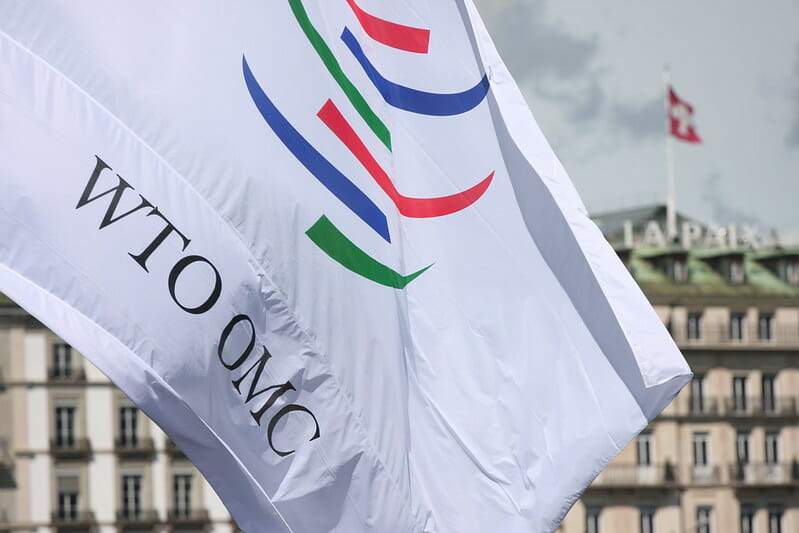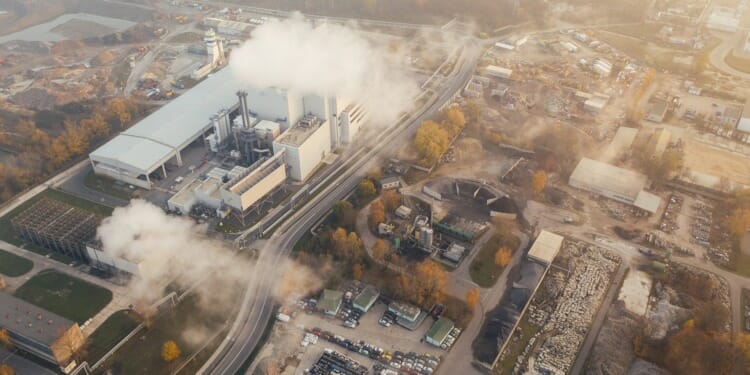The agreements reached at Cop26, including the Glasgow Climate Pact, could be in jeopardy due to legal action from multinationals if global trade rules are not changed, civil societies have warned UK ministers.
A group of NGOs, unions and environmental campaign groups urged the government to push for change at the World Trade Organisation (WTO) summit. The letter was sent to ministers Anne Marie Trevelyan, Secretary of State for International Trade, and Cop26 President Alok Sharma.
The letter, which was seen by The Independent, requested UK ministers to urge the WTO to agree to a “climate waiver” that would stop countries from using the organisation to challenge each other’s climate legislation.
Twelve groups, including Trade Justice Movement, Friends of the Earth, Traidcraft, Global Justice Now and Unison, all warned in the letter that governments might be reluctant to adopt bilateral treaties to reduce emissions out of fear that polluting companies might threaten legal action.
The letter went on to state:
“Whilst making some important steps in the right direction, the climate conference did not live up to expectations […] Extreme weather events are already devastating communities around the world, and the risk of catastrophic climate change is growing. We must use all the tools available to stand the best chance of averting this.”
A government spokesperson told The Independent that the UK government is currently pursuing “ambitious international action” that will “promot[e] trade and investment that will help protect the planet for generations to come.”
However, the WTO’s MC12 summit at which civil societies hoped the UK could push for stricter rules, has been postponed due to concerns over the new Omicron COVID variant. The ministerial summit was set to be based at the WTO’s headquarters in Geneva, and the largest gathering in four years, with 164 governments in attendance.
Regret the difficult decision to postpone the @WTO 12th Ministerial Conference due to the new Omicron COVID-19 variant. Disappointing as that is, the health of our members & staff comes first! Equity in treatment of all members is paramount! Regardless, negotiations continue!
— Ngozi Okonjo-Iweala (@NOIweala) November 27, 2021
There is currently no new date set for the summit. The summit expected to see key issues discussed, such as the waiving of covid vaccine patents, as well as fishery subsidies.
The impact of having no WTO summit
The cancellation of the WTO is understandable, but not good news. Beyond the impact on climate policy, it is going to be far harder to resolve key international issues. The WTO is trying to prove that it is still relevant – it has only ever managed one update to its global trade rules in its 26 year history.
What is somewhat ironic is that the postponing of this summit, due to Omicron, a new variant of COVID, will also impede efforts to fight it, as talks on waiving vaccine patents will be delayed. The variant emerged in Botswana and quickly spread to South Africa, affecting further countries in Africa, where there are lower rates of vaccination than in Europe. The waiving of patents, it is hoped, would help those in developing countries have better access to vaccines.
Related Articles: COP26: Agreement Satisfies Few, but Is Seen As Only Way Forward | New Covid Variant after Delta: Should We Worry? | Environmental Law Cases to Watch Out For in 2021
How changing trade rules could help strengthen climate legislation
The role of global trade is an important part of the fight against climate change. Trade can improve the economic growth and prosperity of countries, which can help countries implement environmentally friendly policies. On the other hand, with the liberalisation of trade there is greater opportunity for polluters to outsource their harmful activities to countries with more relaxed rules on environmental degradation.
This second scenario is what environmental groups are concerned with. Countries like Malaysia in the past have told the UK that it would have to change its policy approach to palm oil if it wanted a deal with the country. This is because EU policy, which the UK still currently follows, conflicts with the policy of India and Malaysia when it comes to biofuels. Palm oil is a major contributor to deforestation.
The other issue is that trade rules could limit the ability for countries to trade important green technology with one another, including technology used to create renewable energy.

But most importantly, is the threat of companies suing countries that no longer allow them to pollute to the same extent. The letter uses the Netherlands as an example, which was sued by the German energy company RWE, due to its efforts to phase out coal-fired power stations. RWE, along with TC Energy, Uniper, Rockhopper, and Ascent are all suing governments through investor-state dispute settlements (ISDS). ISDS are corporate courts that act outside of the country’s domestic legal system that relate to trade deals. There has been an increase in these settlements over the past few years, and many have resulted in the rolling back of climate legislation. Settlements like these could also require countries to pay huge sums of money to companies in compensation for potential lost revenue due to new climate policies.
There have been steps in the direction towards making climate policy more actionable through trade rules. The issue raised by this letter is that many steps taken so far do not include legally binding agreements, and most of what the WTO is currently doing with regards to environmental issues is holding up talks.
The letter is correct in pointing out the need for concrete legislation to stop polluters from using their leverage to interfere with climate policy. Multinationals will at some point have to come up against the fact that either they will lose money or have to adapt as a result of a changing society.
The fact of the matter is, in the near future we should no longer be relying on fossil fuels, or allow for companies to pollute to the degree that they currently do. It’s become perfectly clear that firm legislation is needed to guide climate policies, to promote sustainable development and global cooperation. But even if the WTO had not been postponed, it’s likely that the environmental movement would have once again had to face up against the banal evil of slow-moving bureaucracy and “blah blah blah”.
One last point: Why hasn’t the WTO considered holding a hybrid summit or entirely virtual? Other major meetings have been carried out this way and one may well wonder why the WTO has not considered the possibility.
Editor’s Note: The opinions expressed here by Impakter.com columnists are their own, not those of Impakter.com. — In the Featured Photo: Factory emitting pollution. Featured Photo Credit: marcinjozwiak.









